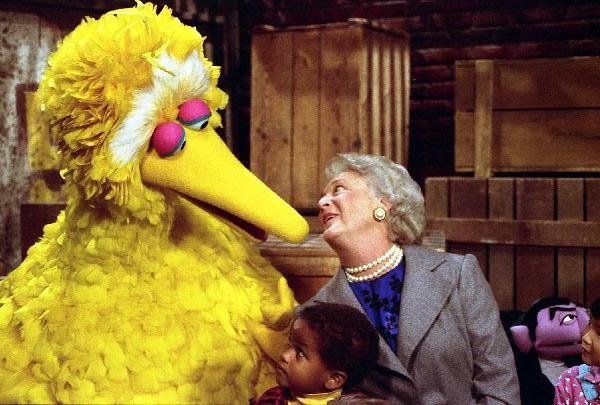First Lady Barbara Bush and Sesame Street's "Big Bird"
U.S. President Donald Trump on Thursday signed an executive order calling for an end to taxpayer funding for NPR and PBS, an escalation of his assault on the media that could shutter hundreds of local stations across the country.
The president's order, which he signed behind closed doors, echoes a section of Project 2025, a far-right agenda that called for stripping public funding from NPR, PBS, and other broadcasters on the grounds that they "do not even bother to run programming that would attract conservatives."
Trump's order instructs the Corporation for Public Broadcasting (CPB)—a private nonprofit corporation created and funded by Congress—to "cease direct funding to NPR and PBS, consistent with my administration's policy to ensure that federal funding does not support biased and partisan news coverage."
The executive order, which is expected to face legal challenges, also directs all federal agencies to "identify and terminate, to the maximum extent consistent with applicable law, any direct or indirect funding of NPR and PBS."
Trump's move was expected, and it came in the wake of reports that the administration intends to ask Congress to rescind previously approved funding for CPB, which is already engaged in a court fight with the president over his attempt to fire several of the organization's board members. The Associated Press reported Thursday that the rescission request "has not yet been sent to Capitol Hill."
According to the organizations' estimates, federal funding accounts for roughly 1% of NPR's annual budget and 15% of PBS's yearly revenue.
In a letter to congressional leaders earlier this week, a coalition of civil society groups led by Reporters Without Borders (RSF) warned that, if enacted, Trump's proposed funding cuts for public broadcasting "will result in the shutdown of dozens, if not hundreds, of local, independent radio and television stations serving Americans in every corner of the country."
"As it stands, public media journalists are often the only reporters attending a school board meeting, or a local zoning hearing, or at the scene of a crime," the groups wrote. "They are the journalists most likely to hold local public officials accountable and expose
corruption. Faraway digital media outlets will not replicate this coverage, and the American public will lose out."
Trump's attack on public broadcasters is part of his administration's broader effort to undermine journalism in the United States and around the world.
RSF said in a report published Friday that Trump's "early moves in his second mandate to politicize the Federal Communications Commission (FCC), ban The Associated Press from the White House, or dismantle the U.S. Agency for Global Media, for example, have jeopardized the country's news outlets and indicate that he intends to follow through on his threats, setting up a potential crisis for American journalism."
"After a century of gradual expansion of press rights in the United States," the group said, "the country is experiencing its first significant and prolonged decline in press freedom in modern history, and Donald Trump's return to the presidency is greatly exacerbating the situation."
NOW READ: Trump's top spy chief blasted as her 'crazy' cash grab is exposed
From Your Site Articles
- Sesame Street's brutal parody of Trump may have led to his 'vendetta' against PBS: report - Alternet.org ›
- 'One of our crown jewels': Ken Burns vigorously defends PBS in response to Trump attacks - Alternet.org ›
- 'A clear violation of the Constitution': NPR sues Trump - Alternet.org ›
- Behind the half-baked arguments flailing bully Trump uses to attack public media - Alternet.org ›
- 'Unnecessarily chaotic': How red state Republicans are quietly fighting back against Trump - Alternet.org ›
- Ex-RNC chair: GOP’s 'self-defeating' war on key agency undermines 'areas they represent' - Alternet.org ›
